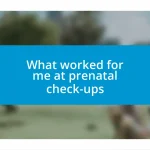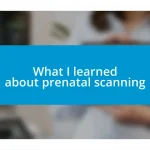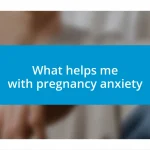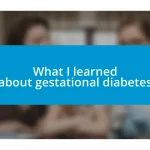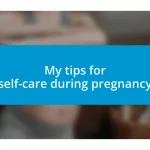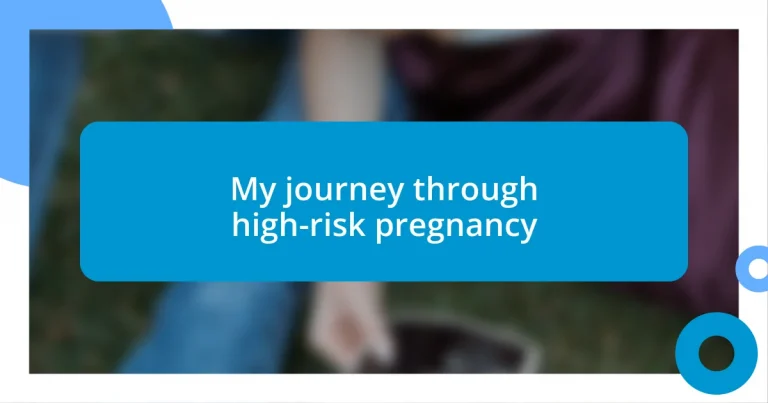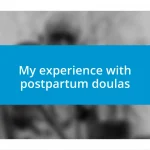Key takeaways:
- High-risk pregnancy involves not only medical challenges but also significant emotional struggles, necessitating open communication and collaboration with healthcare teams.
- Symptoms to monitor include persistent abdominal pain, sudden headaches, swelling, rapid weight gain, and changes in fetal movement, emphasizing the importance of being attuned to one’s body.
- Creating a flexible birth plan and seeking emotional support from others can empower parents-to-be, helping them navigate uncertainties and cope with the emotional rollercoaster of high-risk pregnancy.
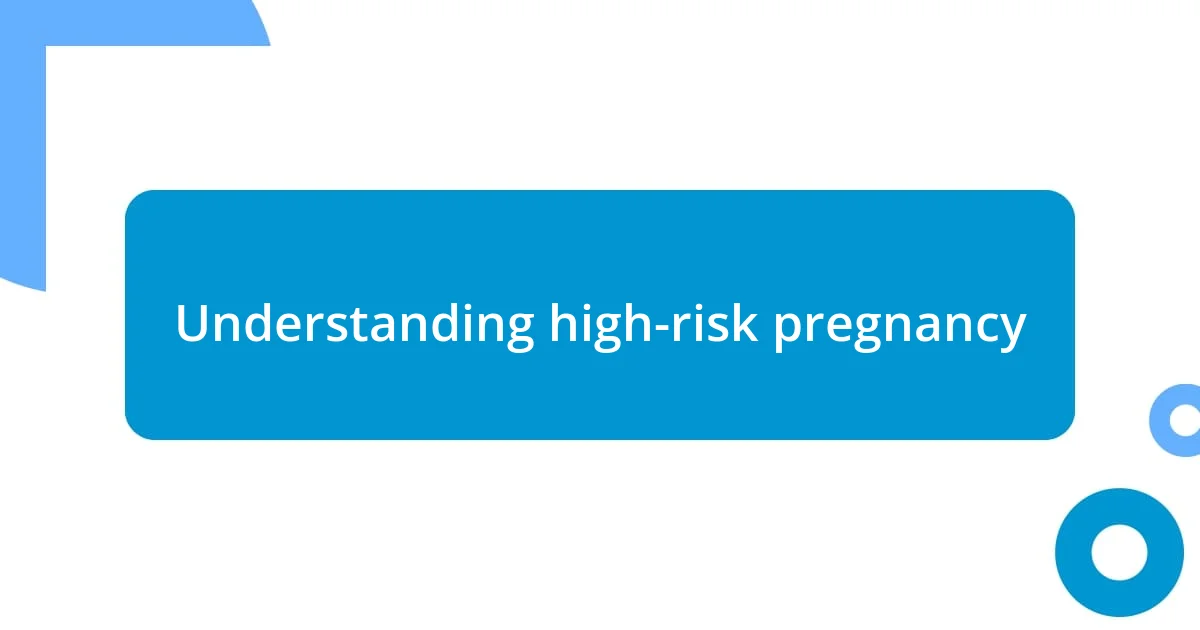
Understanding high-risk pregnancy
High-risk pregnancy is often defined as a pregnancy that carries a higher chance of complications for both the mother and the baby. As I navigated the waters of my own high-risk experience, I learned that this label doesn’t simply mean more doctor visits or monitoring; it can also stir up deep emotional challenges. Have you ever felt the weight of uncertainty? I remember those countless nights spent worrying about my baby’s health, often feeling a mix of hope and anxiety that was hard to shake off.
There are various factors that can lead to a high-risk designation, from preexisting health conditions to lifestyle factors and even age. For instance, meeting a fellow expectant mother at a support group who was battling gestational diabetes opened my eyes to how diverse these circumstances can be. Listening to her story made me realize that while our situations differed, our emotional struggles felt strikingly similar. Have you ever found solace in connecting with someone who truly understands your journey?
Living with a high-risk pregnancy means working closely with your healthcare team to develop a personalized care plan. I often felt overwhelmed by the advice and information thrown my way, but I discovered that asking questions turned the experience into a collaborative journey. When a doctor explained why certain tests were necessary, it helped transform my apprehension into empowerment, reassuring me that I was an active participant in my own health story. Isn’t it amazing how knowledge can shift our perspective?
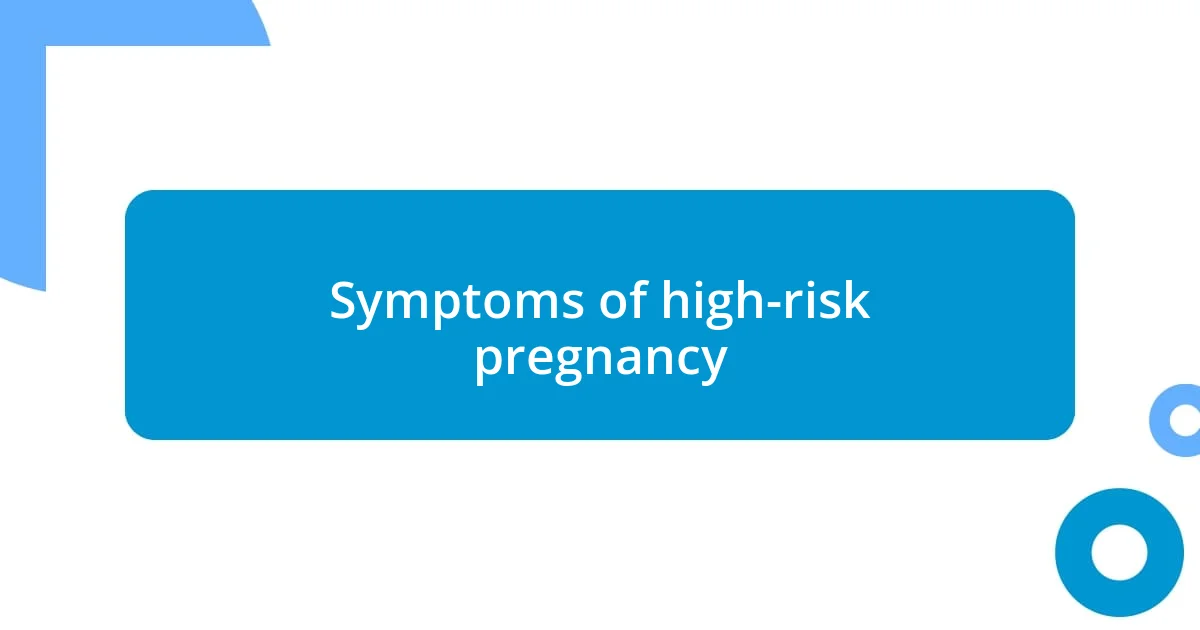
Symptoms of high-risk pregnancy
Navigating the landscape of high-risk pregnancy can feel like walking a tightrope, constantly assessing every little change in your body. I remember when I first felt something wasn’t quite right—an unusual cramping that made my heart race. Suddenly, I was attuned to my body like never before.
Symptoms to watch for can include:
- Persistent abdominal pain that doesn’t subside
- Sudden, severe headaches or vision changes
- Swelling in the hands, feet, or face
- Rapid weight gain over a short period
- Unusual or severe nausea and vomiting
- Changes in fetal movement, such as decreasing kicks
- Bleeding or spotting
Each of these signs can mean different things, and I was both relieved and anxious when one symptom would fade but another would appear. I learned the importance of listening to my body, often noting the tiniest details in a journal, which provided a sense of control. It helped me to share these observations with my healthcare team, letting them into my journey in a way that fostered connection and trust. It’s amazing how much power there is in being attentive to the nuances of your experience.
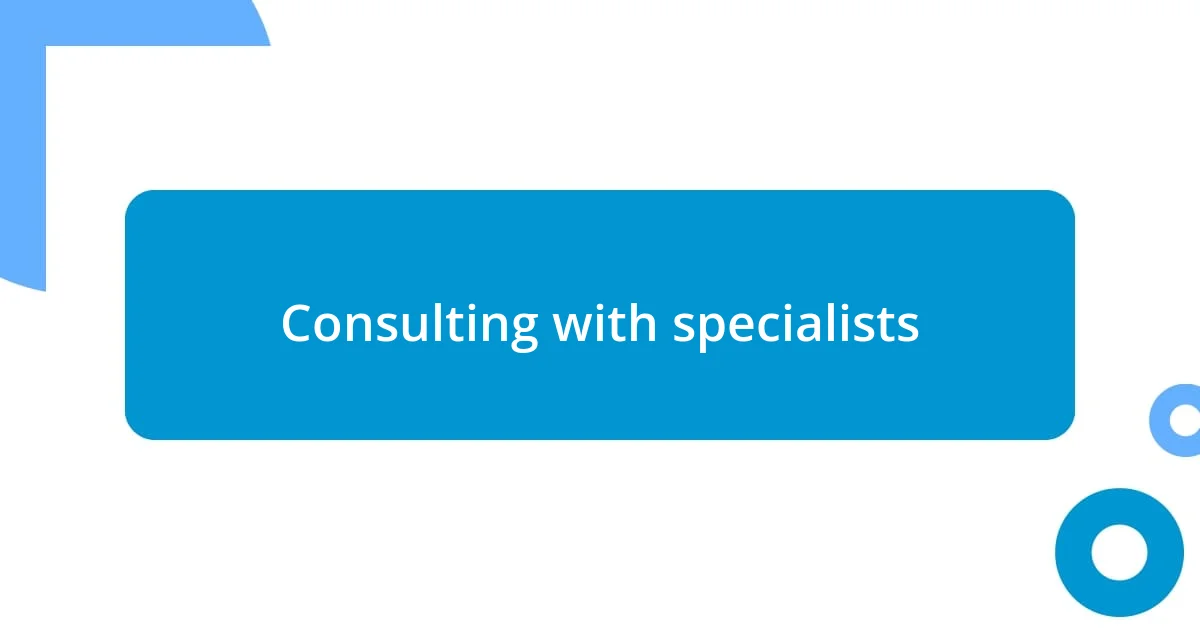
Consulting with specialists
As I moved deeper into my high-risk pregnancy, consulting with specialists became a crucial aspect of my journey. Initially, the idea of seeing multiple doctors felt daunting. I remember my first appointment with a maternal-fetal medicine specialist; I walked in with a mix of hope and trepidation. Their expertise opened my eyes to advanced monitoring techniques that I hadn’t even known existed. It reassured me to have someone who understood the intricacies of my situation so thoroughly.
Engaging with different specialists added layers to my understanding of my pregnancy. Each doctor had a unique approach, which made me appreciate the collective wisdom. I would often find myself sitting in waiting rooms, surrounded by other expectant mothers, sharing experiences about our specialized care. It created a support network I didn’t realize I needed, enhancing my emotional resilience. Have you ever felt lighter just by finding people who share your struggles?
The discussions with these specialists also revealed various options for managing potential complications. I recall the day when my doctor offered various preventive measures that could enhance my baby’s safety. It felt empowering to know there were proactive steps we could take. Instead of feeling helpless, I realized that I could lead part of my own healing journey, collaborating on decisions that would shape mine and my baby’s future. Isn’t it incredible how proactive engagement can restore a sense of control?
| Specialist Type | Focus Area |
|---|---|
| Maternal-Fetal Medicine Specialist | High-risk assessments, ultrasound monitoring |
| Genetic Counselor | Genetic testing and family history evaluation |
| Nutritionist | Diet and nutrition management for health concerns |
| Perinatologist | Advanced care for complex pregnancy issues |
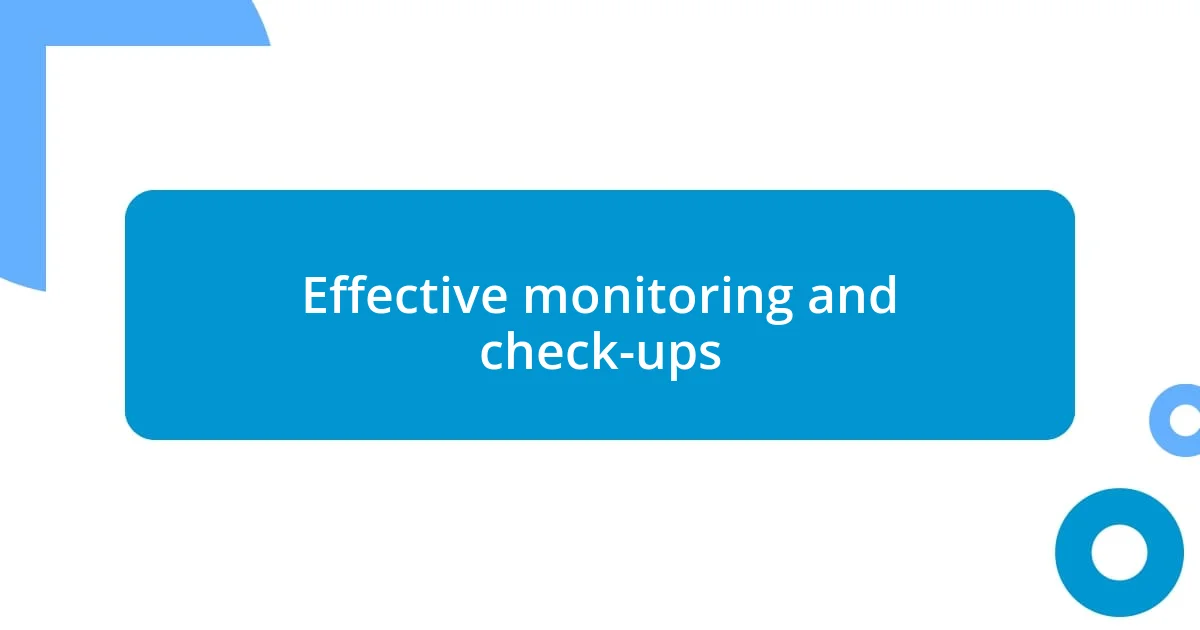
Effective monitoring and check-ups
Effective monitoring through consistent check-ups is essential in managing a high-risk pregnancy. I found myself visiting my healthcare provider more frequently than I anticipated. Each appointment brought a mixture of reassurance and anxiety—what would the ultrasound reveal this time? Those moments of anticipation before hearing my baby’s heartbeat were incredibly emotional, often making or breaking my day.
During my visits, I learned the significance of tests like the non-stress test (NST). It became a regular part of my routine, monitoring my baby’s heart rate and movements. I remember one instance when the nurse smiled at me, saying everything looked perfect. Relief washed over me, a moment of peace amidst the uncertainty. How could something as simple as a heartbeat bring such profound joy and comfort?
Maintaining open communication with my healthcare team proved invaluable. I kept a list of questions ready for each visit, often relating to symptoms or lifestyle changes. It encouraged them to delve deeper into my concerns, fostering a level of trust I hadn’t expected. This collaborative approach felt empowering; it was a reminder that I had an active role in understanding my health. Isn’t it fascinating how even small actions can make a big difference in feeling more secure?
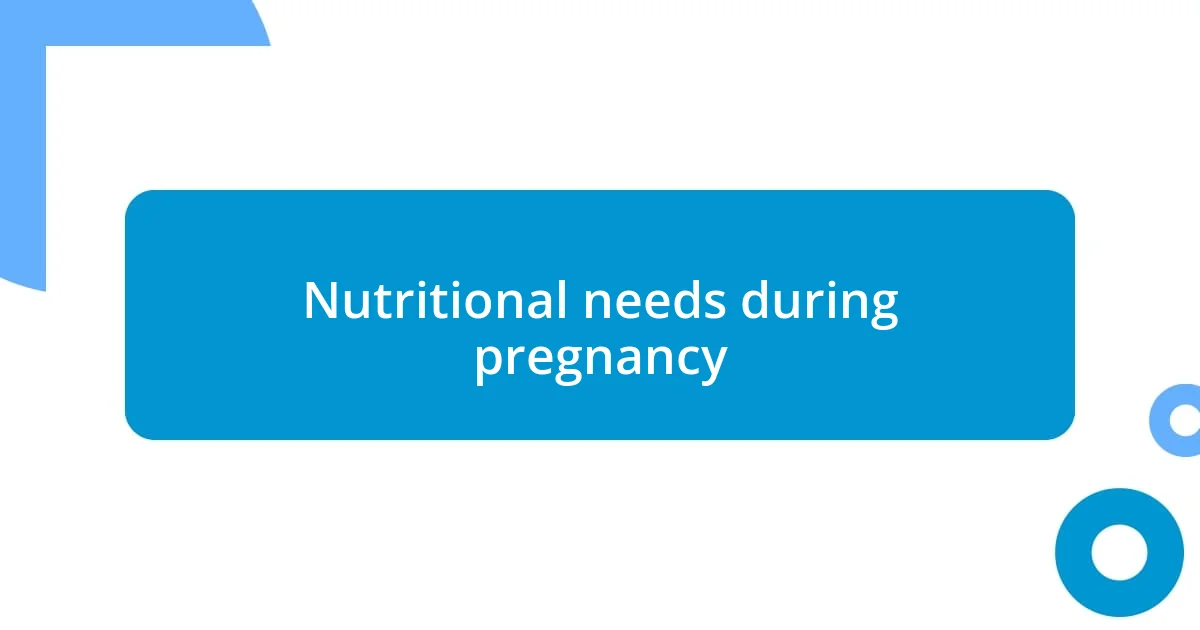
Nutritional needs during pregnancy
Nutritional needs during pregnancy are critical, especially in a high-risk situation like mine. I vividly recall discussing my diet with a nutritionist who emphasized the importance of specific nutrients like folic acid and iron. It struck me how something as simple as an avocado or a handful of spinach could have a profound impact on my baby’s development. Have you ever considered the hidden power of food?
I also learned how hydration played a key role. Staying well-hydrated became a priority for me; I often carried a water bottle everywhere I went. There were days when I struggled to drink enough, but every sip reinforced my commitment to nurture my little one. It was a gentle reminder that my body was not just mine anymore, and the hydration somehow felt like a reassuring embrace.
Incorporating a balanced diet wasn’t always easy, particularly when cravings hit. I remember one particularly overwhelming craving for sweet treats. Instead of indulging completely, I sought healthier alternatives, like yogurt with fresh fruit. This approach not only satisfied my sweet tooth but also benefited my baby’s health. Isn’t it amazing how cravings can lead us to discover new and healthier habits?
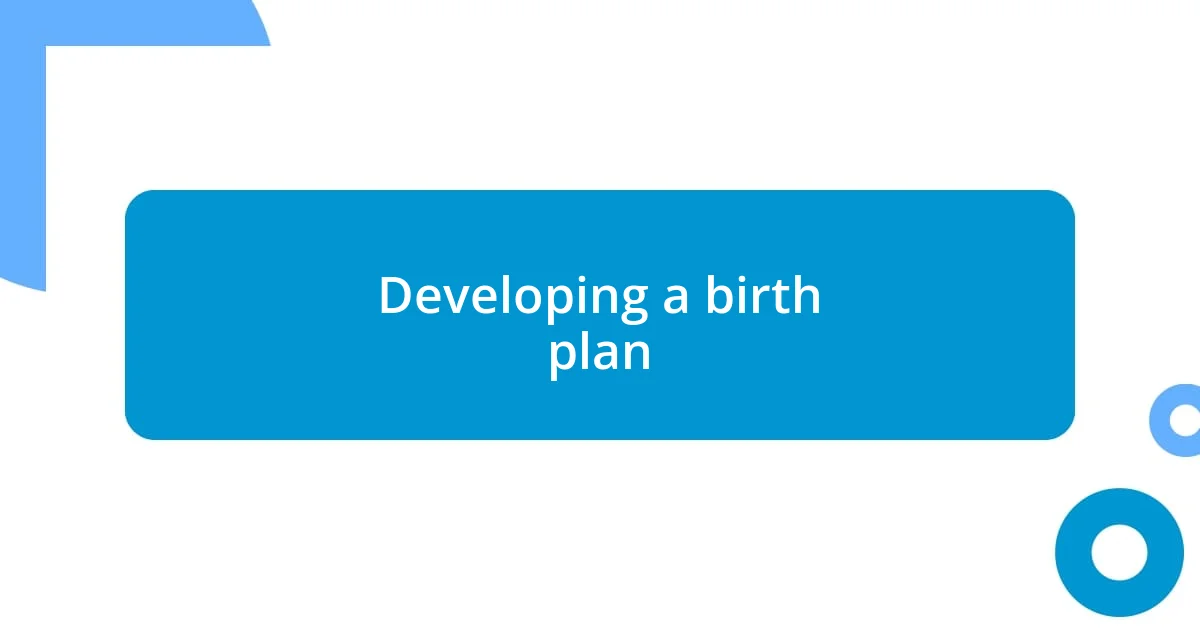
Developing a birth plan
Planning for the birth of your child in the face of high-risk pregnancy can feel overwhelming, but it’s also an empowering process. I remember sitting down with my partner, discussing our hopes and fears. We wanted to ensure that, despite our situation, we could create a birth plan that felt right for us. Deciding on preferences for labor and delivery, including who would be in the room, brought us closer as we faced our uncertainties together.
As I drafted my birth plan, I discovered the importance of flexibility. I initially envisioned a serene, drug-free birth, but as the months progressed, I realized that being adaptable would serve me better. I started to question, how could I embrace potential changes without losing sight of my original desires? Knowing that circumstances might shift allowed me to prepare mentally and emotionally for various scenarios, making me feel more grounded in a sea of unpredictability.
Having open discussions with my healthcare team about my birth plan felt crucial. I remember one particularly reassuring conversation with my doctor, who emphasized the importance of honoring my wishes while keeping my baby’s safety as the top priority. This reassurance provided clarity amidst my swirling thoughts and reinforced the notion that, while plans are important, the wellbeing of both myself and my baby must always come first. Isn’t it interesting how a simple conversation can transform anxiety into a sense of peace?
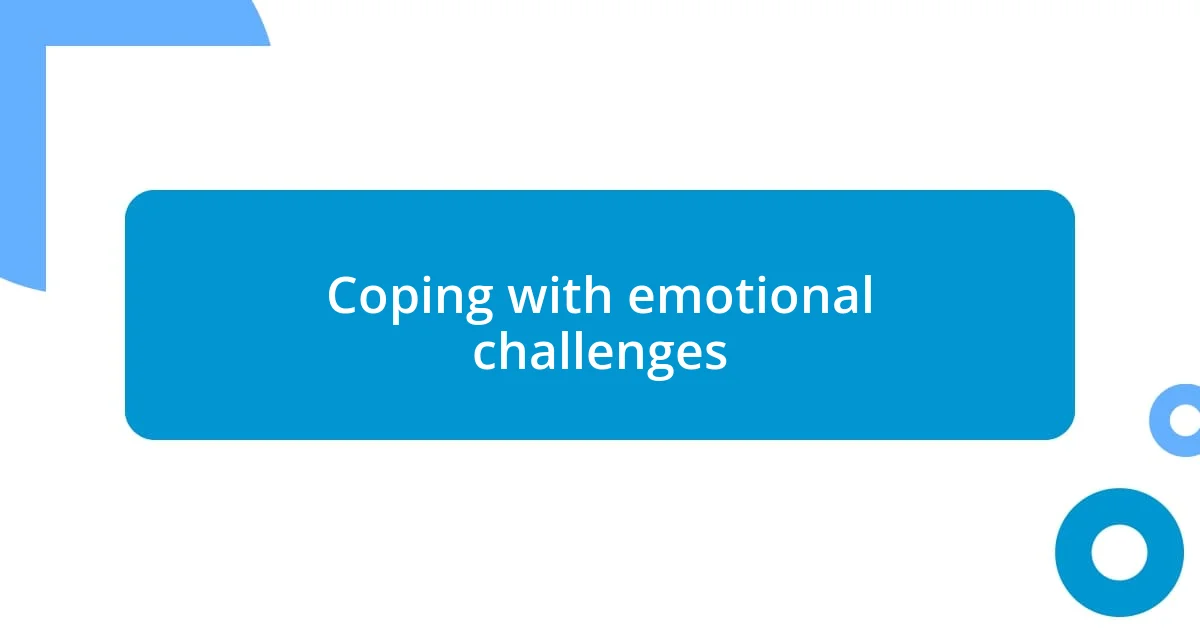
Coping with emotional challenges
Coping with the emotional challenges during my high-risk pregnancy felt like riding an emotional rollercoaster. Each doctor’s appointment brought a mix of hope and anxiety, as I worried endlessly about every tiny symptom. I recall one instance when I received unexpected news, and I found myself sitting in my car, tears streaming down my face. How could I shake off this overwhelming fear? I realized that admitting my feelings was the first step; it was okay to feel scared and vulnerable.
I approached each day with a strategy that included mindfulness and journaling. Writing down my thoughts gave me clarity and a safe space to express my worries. Whenever I felt the urge to spiral, I would pause and breathe deeply, reminding myself of moments when I felt empowered, like the time my partner surprised me with a spontaneous day trip to the beach, lifting my spirits. Have you ever found solace in small surprises? Those little moments became my refuge, grounding me when it felt like everything was out of my control.
Connecting with others who understood my journey was invaluable. I joined an online support group where I could share my experiences and hear from others. Hearing their stories made me feel less isolated in my struggle. It was one night, while reading a message from another mom about her late-night worries, that I realized we were all navigating similar fears. Isn’t it comforting to know that you’re not alone in this? This sense of community gave me strength, reassuring me that together, we could face the emotional waves of high-risk pregnancy.

